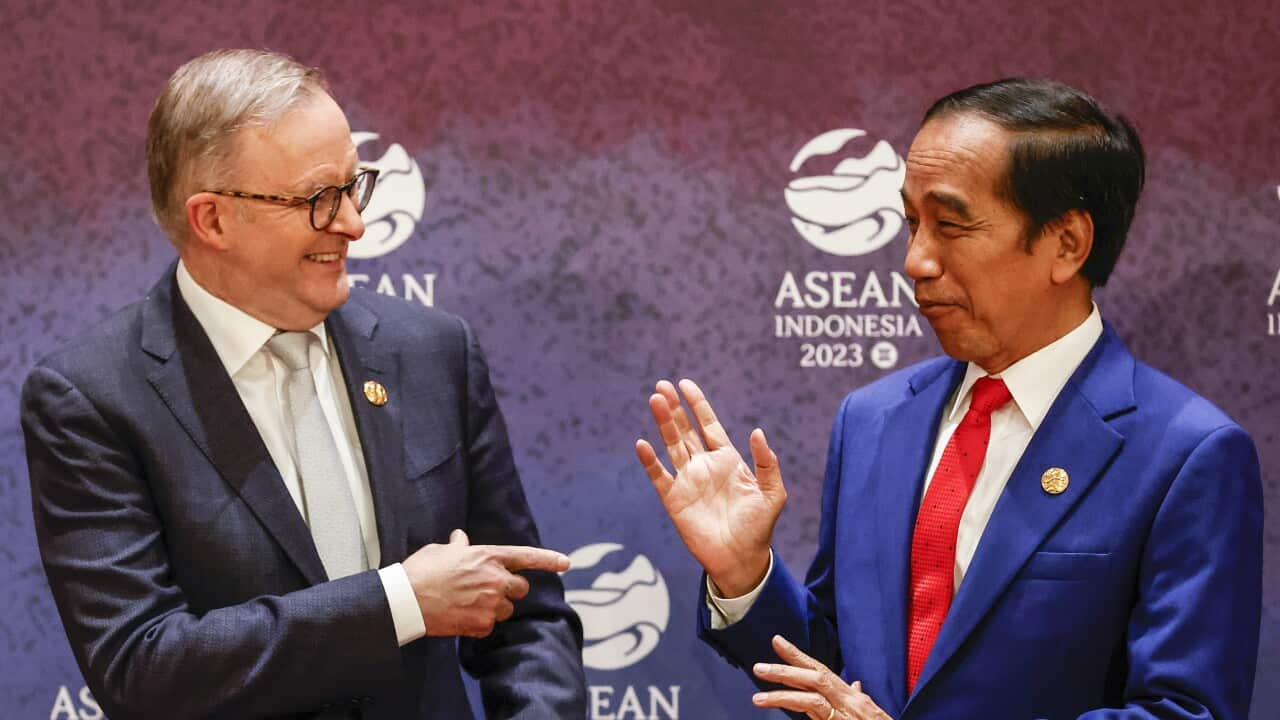TRANSCRIPT
Anthony Albanese will become the first Australian leader to visit China since 2016.
The meeting was secured during talks with the Chinese Premier Li Qiang at the ASEAN summit in Indonesia, as concerns grow about Beijing’s military power.
China's president Xi Jinping elected to skip the summit.
A Jakarta conference room was the scene of a grand diplomatic dance, as a handshake planned for the Chinese President was instead secured with his second in command.
Premier Li began by emphasising Australia and China's shared history.
"Both China and Australia are important countries in the Asia Pacific. Our two countries go back over half a century. A review of our past interactions shows that when our relations are good and sound, both peoples benefit and when things are not going so well, both sides lose from it."
Mr Albanese responded by stressing the mutually beneficial nature of the relationship, which has been bolstered by recent discussions.
“I'm encouraged by the progress that we have made since I met President Xi in Bali. I agree with you that both sides stand to benefit from improving our relations. Our relationship has certainly delivered great benefits to the people of both of our nations. Our deep economic ties for example have over decades allowed both countries to develop and grow, lifting the living standards of people in China but also in Australia."
The meeting between Mr Albanese and President Xi last year delivered $20 billion in trade tariff improvements, although imports like wine and rock lobster exports are still subject to significant duties.
The human rights cost of these agreements, with Australians Cheng Lei and Yang Hengjun still in Chinese detention and three more Australians facing capital punishment in China, remained in the background.
Mr Albanese says that conversations did not avoid flash-point issues in the region around human rights and territory disputes.
"Yes I raised human rights issues in Xinjiang, in Tibet and in Hong Kong. We don't go into every detail of meetings that are held here. I've said I've raised human rights issues, I also raised issues that are the subject of discussion in the region including Taiwan, including South China Sea."
Foreign Minister Penny Wong addressed China’s territorial encroachment in an interview with SBS News.
Ms Wong says that Australia wants to see the United Nations Convention on the Law of the Sea, which sets out the rights, responsibilities and boundaries in relation to maritime claims, honoured in full.
Penny Wong: "If we all want peace, stability and prosperity, then respecting international arrangements is critical to that."
Reporter: "What preconditions would Australia be asking for from China in relation the relation to Chung Lei in order for Australia to conduct a prime ministerial visit?"
Penny Wong: "Look, I don't think it's a smart thing in international relations to establish hard preconditions publicly what I would say is this. In relation to Ms. Cheng Lei and Dr. Yang Jun, we remain concerned about their ongoing detention we have put our view very clearly on behalf of the Australian people that we would like to see Ms. Cheng Lei and Dr. Yang reunited with their families."
With night and day engagements taking place on the sidelines of international summits, as India, China, Japan, Russia and the United States joined for the East Asia Summit, South China Sea disputes were at front and centre.
Premier Li warned of the potential for a new global conflict in the region.
"To manage difference, at present, it is very important to oppose picking sides, oppose bloc confrontation, and oppose a new Cold War."
Behind closed doors, the US Vice President Kamala Harris is said to have described China’s maritime actions as unlawful and provocative.
Vice President Harris' public address stressed the US' shared future with the Indo-Pacific region.
"The US has an enduring commitment to Southeast Asia and more broadly to the Indo-Pacific. We are a proud Pacific power and the American people have a profound stake in the future of the Indo-Pacific. We share historic bonds, and common values with many of the people and nations here."
Indian Prime Minister Narendra Modi said that with major global powers meeting to discuss the future of the region, it was important to listen to the concerns of less developed nations.
"It is essential that we build a rules based post-covid world order and make collective efforts for the welfare of mankind to ensure a free and open Indo-Pacific, and amplifying the voice of the global south is in our common interest."
As the host of these summits, Indonesia has put itself at the centre of the conversation on global security and the economy.
The financial crisis Beijing is facing could create major trade and development for the country's booming population.
Indonesia's prime minister, Joko Widodo, was resolute about what was at stake at the conference.
"We all have the same responsibility to not create new conflict, to not create new tensions, to not create new wars. At the same time, we also have a responsibility to cool down rising tensions, to warm cold situations, and to create room for dialogues that bridge differences."
For Mr Albanese meanwhile, the first Prime Ministerial trip to Beijing in seven years is now confirmed to happen within months.
"I also confirmed the invitation from President Xi that I would accept an invitation and will visit China Later this year at a mutually agreeable time"













